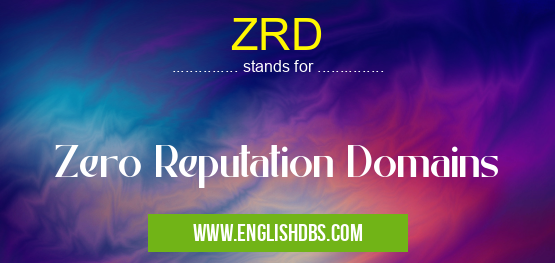What does ZRD mean in UNCLASSIFIED
Zero Reputation Domains (ZRDs) are websites or domains that have no established reputation or trustworthiness in the eyes of search engines. These domains typically have little or no backlinks, social media presence, or other indicators of credibility.

ZRD meaning in Unclassified in Miscellaneous
ZRD mostly used in an acronym Unclassified in Category Miscellaneous that means Zero Reputation Domains
Shorthand: ZRD,
Full Form: Zero Reputation Domains
For more information of "Zero Reputation Domains", see the section below.
What are ZRDs used for?
ZRDs are often used for malicious purposes, such as:
- Phishing: Creating websites that mimic legitimate sites to trick users into providing sensitive information.
- Malware distribution: Hosting malicious software that infects visitors' computers.
- Spam: Sending unwanted or unsolicited emails from ZRDs to avoid detection.
How search engines detect ZRDs?
Search engines use various algorithms and techniques to identify ZRDs, including:
- Backlink analysis: Examining the number and quality of backlinks pointing to a domain.
- Social media presence: Checking if a domain has a significant presence on social media platforms.
- Content analysis: Evaluating the quality and originality of the content on a website.
Impact of ZRDs on SEO
ZRDs can negatively impact a website's search engine rankings. Search engines may:
- De-index ZRDs: Remove them from their index, making them inaccessible to users.
- Lower the rankings of websites linked to ZRDs: This can harm the reputation and visibility of legitimate websites.
Essential Questions and Answers on Zero Reputation Domains in "MISCELLANEOUS»UNFILED"
What are Zero Reputation Domains (ZRDs)?
ZRDs are websites with little to no established reputation or authority within the online community. They often have newly registered domain names, minimal website content, and a lack of backlinks from reputable sources.
Why do search engines flag ZRDs?
Search engines, like Google, use various factors to assess the credibility and relevance of websites. ZRDs often fail to meet these criteria due to their lack of established reputation and thin content. As a result, search engines may flag them as potential sources of low-quality information.
How can I avoid clicking on ZRDs?
To minimize the risk of encountering ZRDs, consider the following tips:
- Use reputable search engines like Google or Bing.
- Be cautious when clicking on links from unknown or untrustworthy sources.
- Check the domain name of a website before visiting it. If it is unfamiliar or recently registered, proceed with caution.
- Look for signs of credibility, such as well-written content, established social media presence, and positive reviews.
What are the potential risks of clicking on ZRDs?
Clicking on ZRDs can expose your device to various risks, including:
- Malware or phishing attacks
- Misleading or inaccurate information
- Unreliable products or services
- Privacy breaches or data theft
How do search engines identify ZRDs?
Search engines use a combination of algorithms and heuristics to detect ZRDs. These factors may include:
- Domain age and registration history
- Content quality and originality
- Backlink profile and anchor text
- User engagement and interaction
Final Words: ZRDs are a threat to online security and can negatively impact SEO. It is crucial for website owners and internet users to be aware of the risks associated with ZRDs and take steps to protect themselves against them.
